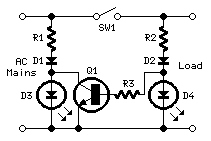Thursday, October 17, 2013
Equipment Indicator Using Two LED
This simple circuit aims to provide an indication of an appliance if it is ON or OFF with the use of green and red LEDs.
The indication produced by the LEDs could mean that the red LED will illustrate that the equipment is turned ON while the green LED will illuminate upon turning OFF the same appliance. It could also be the other way around since green normally signifies that there is life on an equipment. This is applicable with any appliance that is powered and operated by AC mains which can be 230 V or 115 Vac.
A suitable switch SW1 made of single pole single throw type will be capable of handling the full load current. These switches can be in the form of toggle switch, push-to-make switch, push-push switch, tilt switch, reed switch, DIP switch, or push-to-break switch. During the operation, the load and the red diode D4 are being energized when the contacts of switch SW1 is closed. At this stage, the transistor Q1 will get saturated and shorts the green diode D3 which prevents it from illuminating.
Equipment Indicator Using Two LED Schematic

The explanation of the circuit operation pertains to a 230 Vac source. If the source would be coming from 115 Vac mains, the value of R1 and R2 should b3 15K Ohms at 1 W power output. The use of the type of switch SW1 should be able to withstand the full load voltage and current of the equipment.The two LED indicator can are widely used in several equipments and gadgets like the mobile phones. A blackberry phone have a LED indicator that can provide four colors depending on the status of the phone if it is receiving a message or a call, if connected via Wi-Fi, or if connected via Bluetooth. The good thing about the circuit is that it can be used for emergency light indicator, signal light, backup light, dashboard light, or with flash buzzer based on the AD signal light.
- BC337 – a small signal NPN Silicon AF medium power transistor used for general purpose switching and amplifying applications with features such as TO-18 manufactured package, suited for AF driver stages and low power output stages, and divided into three group types.
- Single Pole Single Throw (SPST) – a single on-off switch where the two terminals are either connected together of not connected to anything
The indication produced by the LEDs could mean that the red LED will illustrate that the equipment is turned ON while the green LED will illuminate upon turning OFF the same appliance. It could also be the other way around since green normally signifies that there is life on an equipment. This is applicable with any appliance that is powered and operated by AC mains which can be 230 V or 115 Vac.
A suitable switch SW1 made of single pole single throw type will be capable of handling the full load current. These switches can be in the form of toggle switch, push-to-make switch, push-push switch, tilt switch, reed switch, DIP switch, or push-to-break switch. During the operation, the load and the red diode D4 are being energized when the contacts of switch SW1 is closed. At this stage, the transistor Q1 will get saturated and shorts the green diode D3 which prevents it from illuminating.
Equipment Indicator Using Two LED Schematic

The explanation of the circuit operation pertains to a 230 Vac source. If the source would be coming from 115 Vac mains, the value of R1 and R2 should b3 15K Ohms at 1 W power output. The use of the type of switch SW1 should be able to withstand the full load voltage and current of the equipment.The two LED indicator can are widely used in several equipments and gadgets like the mobile phones. A blackberry phone have a LED indicator that can provide four colors depending on the status of the phone if it is receiving a message or a call, if connected via Wi-Fi, or if connected via Bluetooth. The good thing about the circuit is that it can be used for emergency light indicator, signal light, backup light, dashboard light, or with flash buzzer based on the AD signal light.
Related Posts : equipment,
indicator,
led,
two,
using
Subscribe to:
Post Comments (Atom)
No comments:
Post a Comment